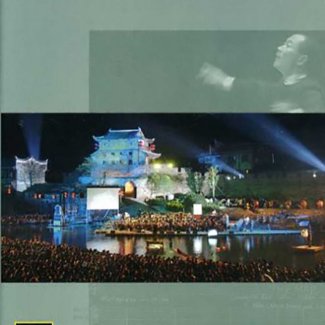



Tan Dun
Links
Download Assets
“Mr. Tan is a dynamic conductor with colorful illustrations for the eye and ear.”
(The New York Times)
UNESCO Global Goodwill Ambassador Tan Dun has made an indelible mark on the global music scene with a creative repertoire that spans the boundaries of classical music, multimedia performance, and Eastern and Western traditions. He has received many of today’s most prestigious honours including the Grammy Award, Academy Award, Bach Prize, Grawemeyer Award, Shostakovich Award, Italy’s Golden Lion Award for Lifetime Achievement, and Istanbul Music Festival’s Lifetime achievement award. Tan Dun’s music has been played worldwide by leading orchestras, opera houses, international festivals, and on radio and television. In 2019, Tan Dun was named Dean of the Bard College Conservatory of Music where he demonstrates music’s extraordinary ability to transform lives and guide the Conservatory in fulfilling its mission of understanding music’s connection to history, art, culture, and society.
As a conductor of innovative programmes, Tan Dun’s upcoming season includes appearances with The Cleveland Orchestra, Orchestre Philharmonique de Radio France, Seattle Symphony Orchestra, Vancouver Symphony Orchestra, Melbourne Symphony Orchestra, and Budesjugendorchester Deutschland. Tan Dun is an Artistic Ambassador of Melbourne Symphony Orchestra, and serves as the Honorary Artistic director of the China National Symphony, Principal Guest conductor at Shenzhen Symphony, and Honorary Artistic Director and Chief Guest conductor of Xi´an Symphony Orchestra. Tan Dun has also led some of the world’s most esteemed orchestras including London Symphony Orchestra, Philadelphia Orchestra, Metropolitan Opera Orchestra, London Philharmonic Orchestra, Luxembourg Philharmonic, Royal Concertgebouw Orchestra, Seattle Symphony Orchestra, Orchestre National de France, BBC Symphony Orchestra, Filarmonica della Scala and Sydney Symphony Orchestra, among others.
Show more
Tan Dun’s individual voice has been heard widely by international audiences. His first Internet Symphony, which was commissioned by Google/YouTube, has reached over 23 million people online. His Organic Music Trilogy of Water, Paper and Ceramic has frequented major concert halls and festivals. Paper Concerto was premiered with Los Angeles Philharmonic at the opening of the Walt Disney Hall. His multimedia work, The Map, premiered by YoYo Ma and Boston Symphony Orchestra, has toured more than 30 countries worldwide. Its manuscript has been collected by the Carnegie Hall Composers Gallery. His Orchestral Theatre IV: The Gate was premiered by Japan’s NHK Symphony Orchestra and crosses the cultural boundaries of Peking Opera, Western Opera and puppet theatre traditions. Most recently, Tan Dun conducted the premiere of his new oratorio epic Buddha Passion at the Dresden Festival with Münchner Philharmoniker, the piece was co-commissioned by New York Philharmonic, Los Angeles Philharmonic, Melbourne Symphony Orchestra and the Dresden Festival and has since had premieres worldwide and will continue with upcoming premieres in London, Hamburg, and Amsterdam.
Tan Dun records for Sony Classical, Deutsche Grammophon, EMI, Opus Arte, BIS and Naxos. His recordings have garnered many accolades, including a Grammy Award (Crouching Tiger, Hidden Dragon) and nomination (The First Emperor; Marco Polo; Pipa Concerto), Japan’s Recording Academy Awards for Best Contemporary Music CD (Water Passion after St. Matthew) and the BBC’s Best Orchestral Album (Death and Fire). Tan Dun’s music is published by G. Schirmer, Inc. and represented worldwide by the Music Sales Group of Classical Companies.
Contacts
Jasper Parrott Executive Chairman HP Group & Associated Companies Federico Hernandez General Manager HarrisonParrott Madrid & Latin American Business
Regional Management
HarrisonParrott exclusively represents Tan Dun as a conductor throughout the world excepting Russian Federation, UAE, Saudi Arabia, North America and France and non-exclusively in China and its territories, Singapore and Japan (Territory).
Federico Hernandez General Manager HarrisonParrott Madrid & Latin American Business
Regional Management
HarrisonParrott exclusively represents Tan Dun as a conductor throughout the world excepting Russian Federation, UAE, Saudi Arabia, North America and France and non-exclusively in China and its territories, Singapore and Japan (Territory).
Season Highlights
Seattle Symphony Orchestra
Show more about Seattle Symphony Orchestra
MANUEL DE FALLA: Dance Rituelle du Feu/ Ritual Fire Dance from El Amor Brujo
TAN DUN: Water Concerto for Percussion and Orchestra
IGOR STRAVINSKY: Feu d’artifice / Fireworks Op.4
TAN DUN: Nu Shu: The Secret Songs of Women, for harp and orchestra
Ghent Festival of Flanders
Show more about Ghent Festival of Flanders
BEDRICH SMETANA: Vltava (The Moldau)
TAN DUN: Water Concerto for Percussion and Orchestra
TAN DUN: Passacaglia: Secret of Wind and Birds
BENJAMIN BRITTEN: Four Sea Interludes from 'Peter Grimes'
“[Tan Dun’s work] was innovative and sophisticated, with Tan intriguing and engaging the audience, breathing new life into musical traditions in an unexpected and modern context, and experimenting with new techniques of creating sounds from instruments.”
“[Tan Dun’s] music is as wide-ranging as it is all-embracing, and resonates with a global audience.”
“[Tan Dun] long ago broke through the limitations of any genre to fashion his own style.”

















































